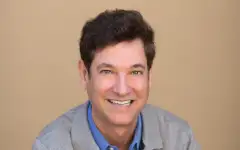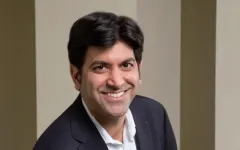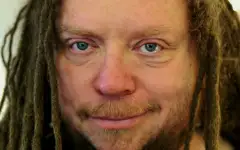Jaron Lanier is a computer scientist, composer, artist and author who writes on numerous topics, including high-technology business, the social impact of technology, the philosophy of consciousness and information, internet politics and the future of humanism.
Lanier's first book, "You Are Not a Gadget, A Manifesto," is an expression of spiritual sensibility in high-tech times. It was a New York Times, Los Angeles Times, Boston Globe and international bestseller and was chosen as one of the best books of the year by Time Magazine and The New York Times. It also won the top prize at the San Francisco Book Festival.
His next book, "Who Owns the Future?", provides a foundational critique of the internet culture and economics. Also an international bestseller, it continues to shape ideas for tech regulation and economics.
In 2015 Lanier published a collection of essays entitled "Wenn Träume Erwachsen Werden" (When Dreams Grow Up). Then came "Dawn of the New Everything," Lanier's memoire of his unusual childhood, early Silicon Valley, and the origins of virtual reality. In addition to a tender memoire, it also serves as a science book for general readers and a historical dissection of tech culture.
His fourth book, "Ten Arguments for Deleting Your Social Media Accounts Right Now," is another international bestseller, synthesizing what we know about the new technology of tricking people using data science with avenues for personal responsibility.
He's won literary awards like the 2014 Peace Prize of the German Book Trade, one of the highest literary honors in the world, and Harvard's Goldsmith Book Prize.
Lanier has been on the cusp of technological innovation from its infancy to the present. A pioneer in virtual reality, Lanier founded VPL Research, the first company to sell VR products, and led teams creating VR applications for medicine, design and numerous other fields. He is currently the "octopus" (which stands for Office of the Chief Technology Officer Prime Unifying Scientist) at Microsoft. He was a founder or principal of start-ups that were acquired by Google, Adobe, Oracle and Pfizer.
In 2018 Lanier was named one of the 25 most influential people in the previous 25 years of tech history by Wired magazine. He's also been named one of the 100 most influential people in the world by Time Magazine, top 100 public intellectuals in the world by Foreign Policy magazine, one of the top 50 World Thinkers by Prospect magazine and one of history's 300 or so greatest inventors in the Encyclopedia Britannica. In 2009 Lanier received a Lifetime Career Award from the IEEE, the preeminent international engineering society.
Lanier's writing appears in The New York Times, Discover, The Wall Street Journal, Forbes, Harpers Magazine, Atlantic, Wired (where he was a founding contributing editor) and Scientific American. He has appeared on The View, PBS NewsHour, The Colbert Report, Nightline and Charlie Rose and has been profiled on the front pages of The Wall Street Journal and The New York Times multiple times.
Lanier is also a musician and artist. He has been active in the world of new "classical" music since the late '70s and writes chamber and orchestral works. He is a pianist and a specialist in unusual and historical musical instruments and maintains one of the largest and most varied collections of actively played instruments in the world.
Recent works include a symphony with full choral settings about William Shakespeare's contemporary and friend Amelia Lanier, commissioned for the Bach Festival Society of Winter Park. He has performed or recorded with a wide range of musicians, including Philip Glass, Yoko Ono, Ornette Coleman, George Clinton, T Bone Burnett, and Steve Reich. He composes and performs frequently on film soundtracks. Credits include composer on Sean Penn's 2010 documentary, The Third Wave, and principle instrumental performer for Richard Horowitz's score for Three Seasons (1999), which won both the Audience and Grand Jury awards at Sundance. Lanier's paintings and drawings have been exhibited in museums and galleries in the United States and Europe.

















